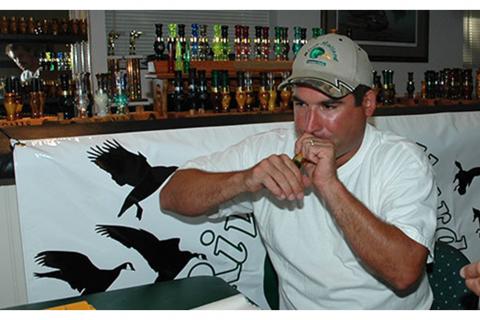
Apply These Tips and Become a Better Waterfowl Caller
It’s an old joke, but it’s quite appropriate given the topic here. A young man, an up-and-coming professional violinist and new to the Big City, asks a seasoned musician the question: “How do you get to Carnegie Hall?” Without a moment’s hesitation, the artist replies matter-of-factly: “Practice, young man. Practice.”

Old, yes, and not all that humorous, but when it comes to becoming a better duck caller, the elder man’s advice stands pat. But practice isn’t the only thing that will help you become a better caller. Just 34, yet wise beyond his years in matters regarding waterfowl calls and the art of calling, Kentuckian Field Hudnall, owner of Field Proven Calls, knows a thing or two about becoming proficient with his instrument of choice.
First things first, the young Southerner told me, as it’s vitally important that callers, new or experienced, find the call that’s right for them. How? That, Hudnall suggested, is the million dollar question.
For the inexperienced or new duck caller, finding the right tool for the task is a matter of research and shopping around. The ideal situation,
according to many call makers, is to attend a consumer show: Ohio’s Waterfowl Boot Camp, for instance. There, new callers have an opportunity to test drive multiple calls from multiple manufacturers.

Listen to the different calls, advised Hudnall. Talk to the call-makers, and don’t be shy about asking questions. And, finally, it’s important for the buyer to actually get his or her hands on the calls and try them, something that can be done at a local retailer like Cabela’s, if you don’t have the chance to attend a consumer show.
Don’t, Hudnall warned, judge a call on appearances alone, as fancy engraving, colors or shiny brass or silver bands really don’t make any difference to the ducks, only to the duck hunter.
Once a hunter settles on and purchases a call, getting proficient with it requires one thing: practice.
Hudnall cautions against procrastination, saying it’s definitely not a good idea to buy a call, and then wait until a week prior to the season to get acquainted with it. Duck calls, he reminds us, are musical instruments, and it is important callers develop and maintain the muscle memory necessary to operate a call proficiently.
Practice sessions, he suggests, need not be rigidly regimented nor grueling. Unlike competitive callers who practice the notes and sounds they’ve not perfected, new callers should develop a routine where they focus on the sounds at which they’re good, be it a greeting call, feeding chuckle, or pleading comeback call.
Hudnall suggests, too, that practice sessions be short, so new callers don’t burn out, get frustrated, or develop bad habits, which they then have to

unlearn and exchange for proper techniques.
But how does a caller learn the sounds and techniques? The video clip giant YouTube, Hudnall says, has made the world of duck calling quite small. Here, callers can hear almost anything they want to hear, including the most important elements, what the species in question, mallard, widgeon or pintail, sounds like, and the mechanics involved to reproduce those same sounds.
Finally, callers should never hesitate to contact the manufacturer of their particular call, and ask questions. Spending time with the buyer, Hudnall reminds all consumers, is the obligation and responsibility of any good call-maker.
Often, Hudnall, along with his brother and partner, Clay, will listen to a caller via cell phone, and troubleshoot that particular individual’s situation in real time. It’s another great resource, said the call-maker, for anyone who wishes to become proficient and successful with this duck hunting tool.
- 1816 views

